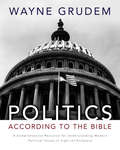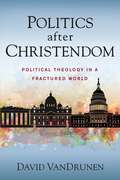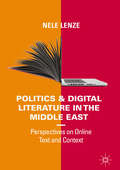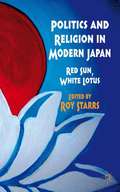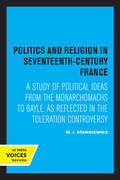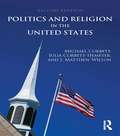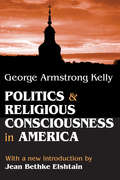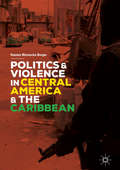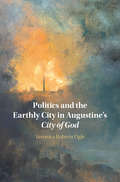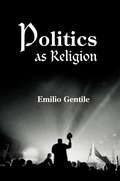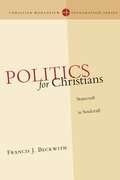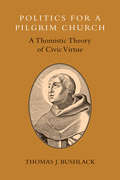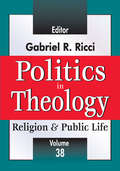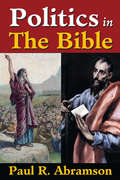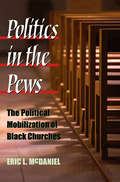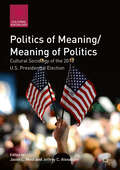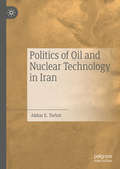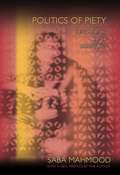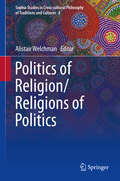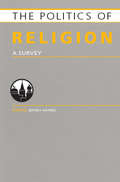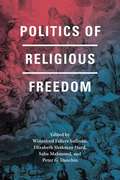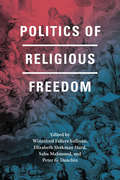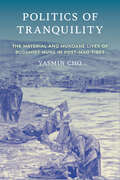- Table View
- List View
Politics - According to the Bible: A Comprehensive Resource for Understanding Modern Political Issues in Light of Scripture
by Wayne A. GrudemA variety of perspectives exist within the Christian community when it comes to political issues and political involvement. This comprehensive and readable book presents a political philosophy from the perspective that the Gospel pertains to all of life so Christians should be involved in political issues. In brief, this is an analysis of conservative and liberal plans to do good for the nation, evaluated in light of the Bible and common sense. In this ground-breaking book, recognized evangelical Bible professor Wayne Grudem rejects five mistaken views about Christian influence on politics: (1) “compel religion,” (2) “exclude religion,” (3) “all government is demonic,” (4) “do evangel-ism, not politics,” and (5) “do politics, not evangelism.” He proposes a better alternative: (6) “significant Christian influence on government.” Then he explains the Bible’s teachings about the purpose of civil government and the characteristics of good or bad government. Does the Bible support some form of democracy? Should judges and the courts hold the ultimate power in a nation? With respect to specific political issues, Grudem argues that most people’s political views depend on deep-seated assump-tions about several basic moral and even theological questions, such as whether God exists, whether absolute moral stan-dards can be known, whether there is good and evil in each person’s heart, whether people should be accountable for their good and bad choices, whether property should belong to individuals or to society, and whether the purpose of the earth’s resources is to bring benefit to mankind. After addressing these foundational questions, Grudem provides a thoughtful, carefully-reasoned analysis of over fifty specific issues dealing with the protection of life, marriage, the family and children, economic issues and taxation, the environment, national defense, relationships to other nations, freedom of speech and religion, quotas, and special interests. He makes frequent application to the current policies of the Democratic and Republi-can parties in the United States, but the principles discussed here are relevant for any nation.
Politics after Christendom: Political Theology in a Fractured World
by David VanDrunenFor more than a millennium, beginning in the early Middle Ages, most Western Christians lived in societies that sought to be comprehensively Christian--ecclesiastically, economically, legally, and politically. That is to say, most Western Christians lived in Christendom. But in a gradual process beginning a few hundred years ago, Christendom weakened and finally crumbled. Today, most Christians in the world live in pluralistic political communities. And Christians themselves have very different opinions about what to make of the demise of Christendom and how to understand their status and responsibilities in a post-Christendom world.Politics After Christendom argues that Scripture leaves Christians well-equipped for living in a world such as this. Scripture gives no indication that Christians should strive to establish some version of Christendom. Instead, it prepares them to live in societies that are indifferent or hostile to Christianity, societies in which believers must live faithful lives as sojourners and exiles. Politics After Christendom explains what Scripture teaches about political community and about Christians' responsibilities within their own communities.As it pursues this task, Politics After Christendom makes use of several important theological ideas that Christian thinkers have developed over the centuries. These ideas include Augustine's Two-Cities concept, the Reformation Two-Kingdoms category, natural law, and a theology of the biblical covenants. Politics After Christendom brings these ideas together in a distinctive way to present a model for Christian political engagement. In doing so, it interacts with many important thinkers, including older theologians (e.g., Augustine, Aquinas, and Calvin), recent secular political theorists (e.g., Rawls, Hayek, and Dworkin), contemporary political-theologians (e.g., Hauerwas, O'Donovan, and Wolterstorff), and contemporary Christian cultural commentators (e.g., MacIntyre, Hunter, and Dreher).Part 1 presents a political theology through a careful study of the biblical story, giving special attention to the covenants God has established with his creation and how these covenants inform a proper view of political community. Part 1 argues that civil governments are legitimate but penultimate, and common but not neutral. It concludes that Christians should understand themselves as sojourners and exiles in their political communities. They ought to pursue justice, peace, and excellence in these communities, but remember that these communities are temporary and thus not confuse them with the everlasting kingdom of the Lord Jesus Christ. Christians' ultimate citizenship is in this new-creation kingdom.Part 2 reflects on how the political theology developed in Part 1 provides Christians with a framework for thinking about perennial issues of political and legal theory. Part 2 does not set out a detailed public policy or promote a particular political ideology. Rather, it suggests how Christians might think about important social issues in a wise and theologically sound way, so that they might be better equipped to respond well to the specific controversies they face today. These issues include race, religious liberty, family, economics, justice, rights, authority, and civil resistance. After considering these matters, Part 2 concludes by reflecting on the classical liberal and conservative traditions, as well as recent challenges to them by nationalist and progressivist movements.
Politics and Digital Literature in the Middle East: Perspectives On Online Text And Context
by Nele LenzeDuring the 2000's, online literature in Arabic language was popular among a larger readership. Writings on subjects dealing with politics, globalization, and social matters gained are well-received. While mapping the genre, this monograph shows literary developments in print and digital during these peak years to provide a historical context for the material. Online literary culture is linked to social, economic, and political developments within the last two decades. This book presents the differences between online and print literature as it relates to writer-readership interaction, literary quality, language and style, critical reception, and circulation. The geographic location of the analysis focuses on Gulf countries featuring a comparative study of Egypt and Lebanon.
Politics and Religion in Modern Japan: Red Sun, White Lotus
by Red Sun White LotusWritten by leading scholars in the field, this book provides new insights, based on original research, into the full spectrum of modern Japanese political-religious activity: from the prewar uses of Shinto in shaping the modern imperial nation-state to the postwar 'new religions' that have challenged the power of the political establishment.
Politics and Religion in Seventeenth-Century France: A Study of Political Ideas from the Monarchomachs to Bayle, as Reflected in the Toleration Controversy
by W.J. StankiewiczThis title is part of UC Press's Voices Revived program, which commemorates University of California Press’s mission to seek out and cultivate the brightest minds and give them voice, reach, and impact. Drawing on a backlist dating to 1893, Voices Revived makes high-quality, peer-reviewed scholarship accessible once again using print-on-demand technology. This title was originally published in 1960.
Politics and Religion in the United States
by Michael Corbett Julia Corbett-Hemeyer J. Matthew WilsonThere is a complex relationship between religiosity and secularism in the American experience. America is notable both for its strict institutional separation of church and state, and for the strong role that religion has played in its major social movements and ongoing political life.?This book seeks to illuminate for readers the dynamics underlying this seeming paradox, and to examine how the various religious groups in America have approached and continue to approach the tensions between sacred and secular. This much-anticipated revision brings Corbett and Corbett’s classic text fully up to date. The second edition continues with a thorough discussion of historical origins of religion in political life, constitutional matters, public opinion, and the most relevant groups, all while taking theology seriously. Revisions include fully updating all the public opinion data, fuller incorporation of voting behavior among different religious and demographic groups, enhanced discussion of minority religions such as Mormonism and Islam, and new examples throughout.
Politics and Religious Consciousness in America
by George Armstrong KellyThis exploration of the tensions of politics and religion in the United States, from its earliest settlement to contemporary times, is the first coherent history of American religious thought and practice within the context of politics. Kelly sets forth a chronology and topology of the patterns of collaboration, competition, and interaction of politics and religion in America.
Politics and Violence in Central America and the Caribbean
by Hannes Warnecke-BergerThis book develops a comparative study on violence in Jamaica, El Salvador, and Belize based on a theoretical approach, extensive field research, and in-depth empirical research. It combines the Caribbean and Central America into a single comparative research that explores the historical (from the conquista onwards) as well as contemporary causes of violence in these societies. The volume focuses on forms of violence such as gang violence, police violence, every day forms of violence, vigilantism, and organized crime. The analysis provides a theoretical perspective that bridges political economy as well as cultural approaches in violence research. As such, it will be of interest to readers studying development, violence, political, Central American, and Caribbean studies.
Politics and the Earthly City in Augustine's City of God
by Veronica Roberts OgleIn this volume, Veronica Roberts Ogle offers a new reading of Augustine's political thought as it is presented in City of God. Focusing on the relationship between politics and the earthly city, she argues that a precise understanding of Augustine's vision can only be reached through a careful consideration of the work's rhetorical strategy and sacramental worldview. Ogle draws on Christian theology and political thought, moral philosophy, and semiotic theory to make her argument. Laying out Augustine's understanding of the earthly city, she proceeds by tracing out his rhetorical strategy and concludes by articulating his sacramental vision and the place of politics within it. Ogle thus suggests a new way of determining the status of politics in Augustine's thought. Her study clarifies seemingly contradictory passages in his text, highlights the nuance of his position, and captures the unity of his vision as presented in City of God.
Politics and the Sacred
by Harald WydraThis path-breaking book argues that practices of the sacred are constitutive of modern secular politics. Following a tradition of enquiry in anthropology and political theory, it examines how limit situations shape the political imagination and collective identity. As an experiential and cultural fact, the sacred emerges within, and simultaneously transcends, transgressive dynamics such as revolutions, wars or globalisation. Rather than conceive the sacred as a religious doctrine or a metaphysical belief, Wydra examines its adaptive functions as origins, truths and order which are historically contingent across time and transformative of political aspirations. He suggests that the brokenness of political reality is a permanent condition of humanity, which will continue to produce quests for the sacred, and transcendental political frames. Working in the spirit of the genealogical mode of enquiry, this book examines the secular sources of political theologies, the democratic sacred, the communist imagination, European political identity, the sources of human rights and the relationship of victimhood to new wars.
Politics as Religion
by Emilio GentileEmilio Gentile, an internationally renowned authority on fascism and totalitarianism, argues that politics over the past two centuries has often taken on the features of religion, claiming as its own the prerogative of defining the fundamental purpose and meaning of human life. Secular political entities such as the nation, the state, race, class, and the party became the focus of myths, rituals, and commandments and gradually became objects of faith, loyalty, and reverence. Gentile examines this "sacralization of politics," as he defines it, both historically and theoretically, seeking to identify the different ways in which political regimes as diverse as fascism, communism, and liberal democracy have ultimately depended, like religions, on faith, myths, rites, and symbols. Gentile maintains that the sacralization of politics as a modern phenomenon is distinct from the politicization of religion that has arisen from militant religious fundamentalism. Sacralized politics may be democratic, in the form of a civil religion, or it may be totalitarian, in the form of a political religion. Using this conceptual distinction, and moving from America to Europe, and from Africa to Asia, Gentile presents a unique comparative history of civil and political religions from the American and French Revolutions, through nationalism and socialism, democracy and totalitarianism, fascism and communism, up to the present day. It is also a fascinating book for understanding the sacralization of politics after 9/11.
Politics for Christians: Statecraft as Soulcraft
by Francis J. BeckwithPolitics is concerned with citizenship and the administration of justice--how communities are formed and governed. The role of Christians in the political process is hotly contested, but as citizens, Francis Beckwith argues, Christians have a rich heritage of sophisticated thought, as well as a genuine responsibility, to contribute to the shaping of public policy. <P><P>In particular, Beckwith addresses the contention that Christians, or indeed religious citizens of any faith, should set aside their beliefs before they enter the public square. What role should religious citizens take in a liberal democracy? What is the proper separation of church and state? What place should be made for natural rights and the moral law within a secular state? This cogent introduction to political thought surveys political science, politics and government while making the case for how statecraft may genuinely contribute to soulcraft. Politics for Christians is part of The Christian Worldview Integration Series.
Politics for a Pilgrim Church: A Thomistic Theory of Civic Virtue
by Thomas J. BushlackPresents an innovative, constructive alternative to Christian involvement in the "culture wars" Church leaders and scholars have long wrestled with what should provide a guiding vision for Christian engagement in culture and politics. In this book Thomas Bushlack argues that a retrieval of Thomas Aquinas's understanding of civic virtue provides important resources for guiding this engagement today. Bushlack suggests that Aquinas's vision of the pilgrim church provides a fitting model for seeking the earthly common good of the political community, and he notes the features of a Thomistic account of justice and civic virtue that remain particularly salient for the twenty-first century. The book concludes with suggestions for cultivating a Christian rhetoric of the common good as an alternative to the predominant forms of discourse fostered within the culture wars that have been so divisive.
Politics for a Pilgrim Church: A Thomistic Theory of Civic Virtue
by Thomas J. BushlackPresents an innovative, constructive alternative to Christian involvement in the "culture wars" Church leaders and scholars have long wrestled with what should provide a guiding vision for Christian engagement in culture and politics. In this book Thomas Bushlack argues that a retrieval of Thomas Aquinas's understanding of civic virtue provides important resources for guiding this engagement today. Bushlack suggests that Aquinas's vision of the pilgrim church provides a fitting model for seeking the earthly common good of the political community, and he notes the features of a Thomistic account of justice and civic virtue that remain particularly salient for the twenty-first century. The book concludes with suggestions for cultivating a Christian rhetoric of the common good as an alternative to the predominant forms of discourse fostered within the culture wars that have been so divisive.
Politics in Theology: Religion And Public Life
by Gabriel R. RicciThis new volume examines the relationship between religion and politics from a historical perspective. Contributors address specific moments in which political governance intersects with religious ideals in dramatic ways. These moments question the relationship between religious sentiments and political solutions and threaten to reorder the geopolitical landscape.These essays discuss the tensions produced by secularism in an Islamic culture, the influence of Catholic theology in workers' political movements, and how Hinduism has been transformed by the political process. Also featured are essays that emphasize how civil religion coincides with constitutional order, and how the drama of religious tolerance and legitimization of the power of Christian hierarchy originated in the political power of the Roman emperor.This volume is an interdisciplinary effort from up-and-coming and cutting-edge scholars. Contents include: "Something as Yet Unfinished," Adam Stauffer; "Carl Schmitt, Leo Strauss, and the Necessity of Political Theology," Grant N. Havers; "Escape from Theology," Peter Grosvenor; "The Persistence of Civil Religion in Modern Canada," John von Heyking; "The Politicization of Hinduism and the Hinduization of Politics," Jeffery D. Long; "Ontology, Plurality, and Roman Catholic Social Teaching," Roland Boer; "The Pseudo-Isidorian Decretals and Church-State Conflict," Mary Sommar; "Thomas Aquinas on Providence, Prudence, and Natural Law," Christopher S. Morrissey; "The Mystical Body of Christ and French Catholic Action, 1926-1949," W. Brian Newsome; and "Secularism in Turkey," Oya Dursun-Ozkanca.
Politics in the Bible
by Paul AbramsonThe Bible is fundamental to Western culture. Political philosophers from Hobbes, Locke, Montesquieu, and Rousseau to modern political theorists such as George H. Sabine, Leo Strauss, and Sheldon S. Wolin have drawn upon biblical examples. American political leaders, such as Thomas Paine, Abraham Lincoln, and William Jennings Bryan all drew heavily upon the Bible. Today, most contemporary politicians display less familiarity with Scripture although many proudly proclaim themselves to be born-again Christians. Politics in the Bible has a simple goal: to help readers to think critically about how the Bible illuminates understanding of justice, leadership, and politics. For a political scientist, there are great advantages to studying the Bible. Students of the Bible have short texts to analyze, but they have a history of two thousand years of Jewish and Christian scholarly discussion. In that tradition, Paul R. Abramson analyzes stories drawn from eighteen of the thirty-nine books of the Hebrew Bible and fifteen of the twenty-seven books of the New Testament. Abramson argues that the Bible is a book that should be read even by those who do not believe it has any transcendent significance. One can choose to read it as the revealed word of God, as a source of Western morality, as a compilation of interesting stories, poetry, and history, or as a work of great literature. Although this book discusses selected stories that have political implications, it also considers parts that have literary merit. This unusual volume may stimulate new thinking about the Bible as a source of insight into political ideas.
Politics in the Pews: The Political Mobilization of Black Churches
by Mcdaniel Eric L."Politics in the Pewsprobes the internal dynamics of political decision making within the Black church. " ---William E. Nelson, Jr. , Research Professor, Department of African American and African Studies, Ohio State University As Eric McDaniel demonstrates in his study of Black congregations in the U. S. , a church's activism results from complex negotiations between the pastor and the congregation. The church's traditions, its institutional organization, and its cultural traditions influence the choice to make politics part of the church's mission. The needs of the local community and opportunities to vote, lobby, campaign, or protest are also significant factors. By probing the dynamics of churches as social groups, McDaniel opens new perspectives on civil rights history and the evangelical politics of the twenty-first century. Politics in the Pewscontributes to a clearer understanding of the forces that motivate any organization, religious or otherwise, to engage in politics. Eric L. McDaniel is Assistant Professor in the Department of Government at the University of Texas at Austin.
Politics of Meaning/Meaning of Politics: Cultural Sociology of the 2016 U.S. Presidential Election (Cultural Sociology)
by Jeffrey C. Alexander Jason L. MastThe 2016 U.S. presidential election revealed a nation deeply divided and in flux. This volume provides urgently needed insights into American politics and culture during this period of uncertainty. The contributions answer the election’s key mysteries, such as how contemporary Christian evangelicals identified in the unrepentant candidate Trump a hero to their cause, and how working class and economically struggling Americans saw in the rich and ostentatious candidate a champion of their plight. The chapters explain how irrationality is creeping into political participation, and demonstrate how media developments enabled a phenomenon like “fake news” to influence the election. At this polarized and contentious moment, this volume satisfies the urgent need for works that carefully analyze the forces and tensions tearing at the American social fabric. Simultaneously intellectual and accessible, this volume is designed to illuminate the 2016 U.S. presidential election and its aftermath for academics and students of politics alike.
Politics of Oil and Nuclear Technology in Iran
by Akbar E. TorbatThis book focuses on oil politics and the development of nuclear technology in Iran, providing a broader historical context to understand Iran’s foreign relations and nuclear policy. The author assesses Iran's encounters with the West in light of major confrontations both in terms of open conflict as well as controversies surrounding treaties with foreign powers. In seeking to understand the geopolitics of oil in direct parallel to the geopolitics of nuclear technology, the book concentrates on Iran’s struggles to nationalize its oil, neo-colonialism, the formation of the oil consortium, and the more recent US backtracking on the nuclear deal with Iran.
Politics of Piety: The Islamic Revival and the Feminist Subject
by Saba MahmoodPolitics of Piety is a groundbreaking analysis of Islamist cultural politics through the ethnography of a thriving, grassroots women's piety movement in the mosques of Cairo, Egypt. Unlike those organized Islamist activities that seek to seize or transform the state, this is a moral reform movement whose orthodox practices are commonly viewed as inconsequential to Egypt's political landscape. Saba Mahmood's compelling exposition of these practices challenges this assumption by showing how the ethical and the political are indelibly linked within the context of such movements. Not only is this book a sensitive ethnography of a critical but largely ignored dimension of the Islamic revival, it is also an unflinching critique of the secular-liberal assumptions by which some people hold such movements to account. The book addresses three central questions: How do movements of moral reform help us rethink the normative liberal account of politics? How does the adherence of women to the patriarchal norms at the core of such movements parochialize key assumptions within feminist theory about freedom, agency, authority, and the human subject? How does a consideration of debates about embodied religious rituals among Islamists and their secular critics help us understand the conceptual relationship between bodily form and political imaginaries? Politics of Piety is essential reading for anyone interested in issues at the nexus of ethics and politics, embodiment and gender, and liberalism and postcolonialism. In a substantial new preface, Mahmood addresses the controversy sparked by the original publication of her book and the scholarly discussions that have ensued.
Politics of Religion/Religions of Politics
by Alistair WelchmanThe liberal enlightenment as well as the more radical left have both traditionally opposed religion as a reactionary force in politics, a view culminating in an identification of the politics of religion as fundamentalist theocracy. But recently a number of thinkers--Agamben, Badiou, Tabues and in particular Simon Critchley--have begun to explore a more productive engagement of the religious and the political in which religion features as a possible or even necessary form of human emancipation. The papers in this collection, deriving from a workshop held on and with Simon Critchley at the University of Texas at San Antonio in February 2010, take up the ways in which religion's encounter with politics transforms not only politics but also religion itself, molding it into various religions of politics, including not just heretical religious metaphysics, but also what Critchley describes as non-metaphysical religion, the faith of the faithless. Starting from Critchley's own genealogy of Pauline faith, the articles in this collection explore and defend some of the religions of politics and their implications. Costica Bradatan teases out the implications of Critchley's substitution of humor for tragedy as the vehicle for the minimal self-distancing required for any politics. Jill Stauffer compares Critchley's non-metaphysical religiosity with Charles Taylor's account of Christianity. Alistair Welchman unpacks the political theology of the border in terms of god's timeless act of creation. Anne O'Byrne explores the subtle dialectic between mores and morality in Rousseau's political ethics. Roland Champagne sees a kind non-metaphysical religion in Arendt's category of the political pariah. Davide Panagia presents Critchley's ethics of exposure as the basis for a non-metaphysical political bond. Philip Quadrio wonders about the political ramifications of Critchley's own 'mystical anarchism' and Tina Chanter re-reads the primal site in the Western tradition at which the political and the religious intersect, the Antigone story, side-stepping philosophical interpretations of the story (dominated by Hegel's reading) by means of a series of post-colonial re-imaginings of the play. The collection concludes with an interview with Simon Critchley taking up the themes of the workshop in the light of more recent political events: the Arab Spring and the rise and fall of the Occupy movement.
Politics of Religion: A Survey
This title explores some of the key issues which surround the politics of religion, an area which has historically been the cause of great controversy. Today religion is still the cause of a great deal of political debate, be it the teaching of the creationist theory in the United States or the relationship of church and state in Arabic countries. Four sections present a thorough overview of the politics of religion in historical perspective: Essay chapters written by a variety of academic and other experts on the major world religions and their relationship with politics, and on topics including religious fundamentalism, church and state and religious terrorism, providing background analysis of the links between religion and politics. A – Z glossary of religions, religious groups, ideas and issues, including entries on Agnosticism, Bradford Council of Mosques, Muslim Brotherhood, Nirvana, the World Council of Churches, etc. Entries are up-to-date and cross referenced for ease of use, and symbols at the end of each entry denote to which major religion(s) the entry refers. Maps for reference, showing adherents to major religions worldwide, adherents to religions in the Middle East, and adherents to the major sub-types of Christianity. This title offers up-to-date and unbiased information that will provide a wealth of information to students, academics, business people and general researchers.
Politics of Religious Freedom
by Saba Mahmood Elizabeth Shakman Hurd Peter G. Danchin Winnifred Fallers SullivanIn a remarkably short period of time, the realization of religious freedom has achieved broad consensus as an indispensable condition for peace. Faced with widespread reports of religious persecution, public and private actors around the world have responded with laws and policies designed to promote freedom of religion. But what precisely is being promoted? What are the cultural and epistemological assumptions underlying this response, and what forms of politics are enabled in the process? The fruits of the three-year Politics of Religious Freedom research project, the contributions to this volume unsettle the assumption--ubiquitous in policy circles--that religious freedom is a singular achievement, an easily understood state of affairs, and that the problem lies in its incomplete accomplishment. Taking a global perspective, the more than two dozen contributors delineate the different conceptions of religious freedom predominant in the world today, as well as their histories and social and political contexts. Together, the contributions make clear that the reasons for persecution are more varied and complex than is widely acknowledged, and that the indiscriminate promotion of a single legal and cultural tool meant to address conflict across a wide variety of cultures can have the perverse effect of exacerbating the problems that plague the communities cited as falling short.
Politics of Religious Freedom (South Atlantic Quarterly Ser. #Vol. 113)
by Saba Mahmood Elizabeth Shakman Hurd Peter G. Danchin Winnifred Fallers Sullivan, Elizabeth Shakman Hurd, Saba Mahmood, and Peter G. DanchinIn a remarkably short period of time, the realization of religious freedom has achieved broad consensus as an indispensable condition for peace. Faced with widespread reports of religious persecution, public and private actors around the world have responded with laws and policies designed to promote freedom of religion. But what precisely is being promoted? What are the cultural and epistemological assumptions underlying this response, and what forms of politics are enabled in the process? The fruits of the three-year Politics of Religious Freedom research project, the contributions to this volume unsettle the assumption—ubiquitous in policy circles—that religious freedom is a singular achievement, an easily understood state of affairs, and that the problem lies in its incomplete accomplishment. Taking a global perspective, the more than two dozen contributors delineate the different conceptions of religious freedom predominant in the world today, as well as their histories and social and political contexts. Together, the contributions make clear that the reasons for persecution are more varied and complex than is widely acknowledged, and that the indiscriminate promotion of a single legal and cultural tool meant to address conflict across a wide variety of cultures can have the perverse effect of exacerbating the problems that plague the communities cited as falling short.
Politics of Tranquility: The Material and Mundane Lives of Buddhist Nuns in Post-Mao Tibet
by Yasmin ChoPolitics of Tranquility concerns the Tibetan Buddhist revival in China, illustrating the lives of Tibetan Buddhist nuns and exploring the political effects that arise from their nonpolitical daily engagements in the remote, mega-sized Tibetan Buddhist encampment of Yachen Gar. Yasmin Cho's book challenges two assumptions about Tibetan Buddhist communities in China. First, against the assumption that a Buddhist monastic community is best understood in terms of its esoteric qualities, Cho focuses on the material and mundane daily practices that are indispensable to the existence and persistence of such a community and shows how deeply gendered these practices are. Second, against the assumption that Tibetan politics toward the Chinese state is best understood as rebellious, incendiary, and centered upon Tibetan victimhood, the nuns demonstrate how it can be otherwise. Tibetan politics can be unassuming, calm, and self-contained and yet still have substantial political effects. As Politics of Tranquility shows, the nuns in Yachen Gar have called forth an alternative way of living and expressing themselves as Tibetans and as female monastics despite a repressive context.
